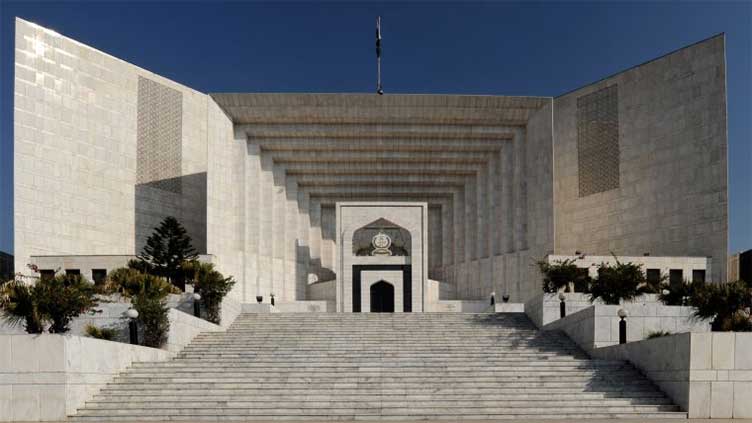Any amendment to Army Act cannot abolish fundamental rights, Advocate Raja tells SC

Pakistan
If a crime is committed by an army official under ordinary law, he will be tried under civil law
ISLAMABAD (Dunya News) – Advocate Salman Akram Raja on Wednesday submitted before the constitutional bench of the Supreme Court that any amendment to the Army Act cannot abolish fundamental rights of a citizen.
Advocate Raja was arguing before a seven-member bench hearing an intra-court appeal against the trial of civilians in military courts as counsel for convict Arzam Junaid. He said according to the law, the crime must be related to the Army Act.
The bench, headed by Justice Amin-ud-Din Khan, includes justices Jamal Khan Mandokhail, Muhammad Ali Mazhar, Justice Hassan Azhar Rizvi, Musarat Hilali, Naeem Akhtar Afghan and Shahid Bilal Hassan.
At the outset of the hearing, Advocate Raja said the 2 (1)(d)(1) was first mentioned in 1975 F.B. Ali case. He called the Army Act a “black hole.” If any amendment is made, fundamental rights will be abolished.
Justice Mandokhail asked the counsel if a member of the Armed Forces commits a crime while sitting in his home, will the Army Act apply? Raja explained to him that if a military personnel flies a kite at his home in Punjab, he would be tried under the civil law as kite flying is prohibited in the province.
He said there are two issues in the case: one is of Article 175; and as far as fundamental rights are concerned, they will not be suspended.
Justice Mandokhail put another question to him that if a soldier marries a second wife without the consent of his first wife, what will happen? Advocate Raja asked the justice “will the case be sent to a military court?"
Justice Afghan, in a lighter tone, addressed the advocate that he has affiliation with a political party. When the party was in power [in 2020], the Army Act was amended and the party vehemently supported that.
Raja replied that at that time, he was not a part of the PTI; "I have always been on the opposition side."
It may be recalled that Pakistan Army (Amendment) Act, 2020 amended the Pakistan Army Act, 1952. It "provides a measure to President of Pakistan, acting on the advice of Prime Minister, to extend the tenure of Chief of Army Staff (COAS) by three years. It also set an upper age limit of 64 years for the COAS."
Justice Mazhar asked him why should the Supreme Court look at Article 2 (1)(d)(1) every time? He responded that if the legal framework changes, judicial review can be carried out. The exception under Article 8(3) is not available for Article 2 (1)(d)(1).
Justice Afghan questioned Raja that an ordinance was promulgated in 1967 for Article 2 (1)(d)(1) which has a limited time frame. Could it be that the ordinance became obsolete after its term expired? In 1967, the ordinance introduced Article 2 (1)(d)(2) into the Army Act. According to the 1973 Constitution, the term of an ordinance is 120 days, with a 120-day extension. Please check what the term of the ordinance was in the constitution at that time. Also, consider the conditions of that time, as a war had taken place, followed by a movement launched by politicians. Could it be that the ordinance was introduced to maintain the regime at that time?
Advocate Raja responded that the Official Secrets Act has been existing since 1923, and trials under it have been taking place since before 1967.
Justice Mandokhail remarked that at that time, it was a one-man show.
Justice Afghan asked Advocate Raja to note down the questions and answer after the break.
Justice Mandokhail said if someone in the civil service commits a crime, he is removed from the job. The civil service does not have the authority to punish. In the Armed Forces, on one hand, he may be dismissed, and on the other, he will also be punished. He sought explanation on whom the Army Act applies.
Justice Mazhar asked the lawyer if a spy is caught, where will trial take place? Justice Hassan Azhar questioned if a civilian gives secrets to an enemy country, where will he be tried?
Salman Akram responded that the trial would be conducted under the Official Secrets Act.
The counsel submitted that there is nowhere in the world where the Constitution grants fundamental rights and someone take them away with the twist of a finger. It cannot happen that a commanding officer says, 'I need the accused; hand them over to me.'
Justice Mazhar observed that the five-member bench had abolished Section 2D. After its abolition, spies cannot be tried in a military court. There are also civilian employees in the Army. If a civilian employee spies for an enemy country, where will their trial take place? Raja replied that he is subject to the Army Act.


